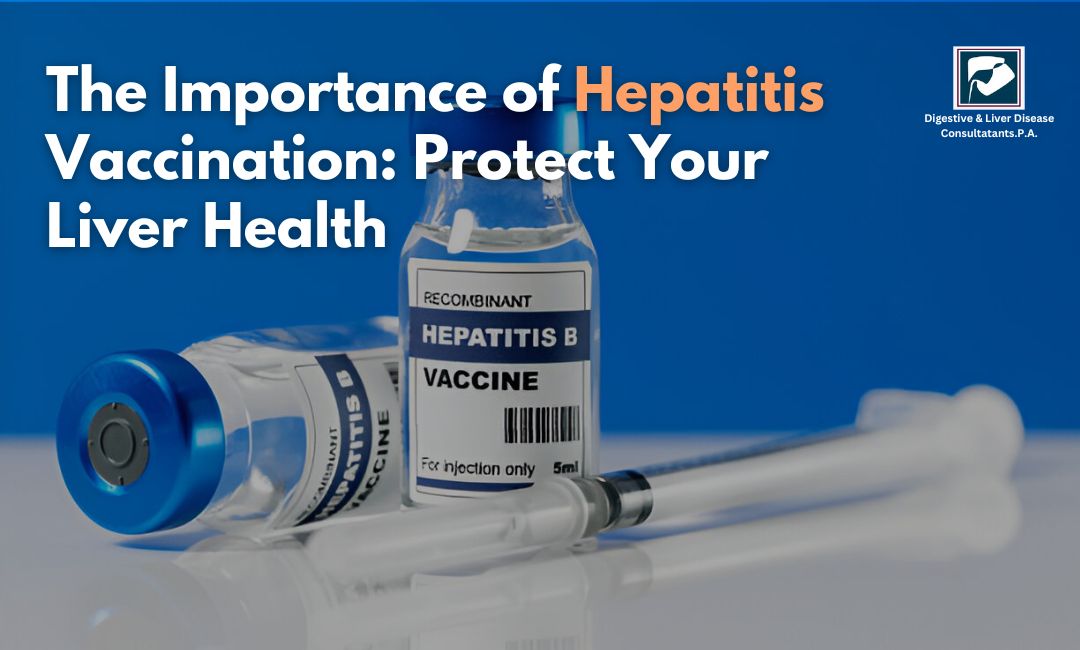Your liver plays a vital role in your overall health. It works tirelessly to process nutrients, filter toxins, and produce essential proteins that keep your body functioning properly. But did you know that your liver can be vulnerable to several harmful diseases, including hepatitis? Hepatitis is a condition that inflames the liver and can lead to serious health complications if left untreated. Fortunately, vaccination can protect you from certain types of hepatitis, safeguarding your liver and your overall well-being.
In this blog, we’ll explore what hepatitis is, how it affects your liver, why vaccination is crucial, and how Digestive & Liver Disease Consultants, P.A. can support your journey to better liver health.
Understanding Hepatitis
Hepatitis refers to inflammation of the liver. It can be caused by various factors, including viruses, excessive alcohol use, certain medications, or autoimmune conditions. Among these causes, viral hepatitis is the most common and concerning. There are five main types of viral hepatitis: A, B, C, D, and E.
Hepatitis A (HAV): Spread through contaminated food or water, hepatitis A typically causes an acute infection. It doesn’t usually lead to long-term liver damage, but it can cause severe symptoms in some cases.
Hepatitis B (HBV): Transmitted through blood, semen, or other bodily fluids, hepatitis B can lead to both acute and chronic liver disease. Chronic HBV infections may result in liver cirrhosis, liver failure, or liver cancer.
Hepatitis C (HCV): Hepatitis C spreads primarily through blood-to-blood contact, often through sharing needles or unsafe medical practices. Chronic hepatitis C is a leading cause of liver damage and liver cancer.
Hepatitis D (HDV): This type only occurs in people already infected with hepatitis B, as it requires HBV to replicate. It can worsen the progression of liver disease.
Hepatitis E (HEV): Common in areas with poor sanitation, hepatitis E is usually transmitted through contaminated water. While it often resolves on its own, it can be more severe in pregnant women and those with weakened immune systems.
How Hepatitis Affects Your Liver Health
When your liver becomes inflamed due to hepatitis, its ability to function properly is compromised. Symptoms of hepatitis can range from mild to severe and may include:
- Fatigue
- Jaundice (yellowing of the skin and eyes)
- Nausea and vomiting
- Abdominal pain
- Dark urine and pale stools
Chronic hepatitis, especially types B and C, can silently damage your liver over time. Without noticeable symptoms, the liver can develop scarring (cirrhosis) or even fail entirely. Early prevention through vaccination is critical to avoid these severe outcomes.
Why Hepatitis Vaccination Is Crucial
Vaccines are a powerful tool in the fight against hepatitis. They not only protect you but also help reduce the spread of these viruses within communities. Let’s break down the benefits:
1. Hepatitis A Vaccine
The hepatitis A vaccine provides long-lasting protection. It’s especially important for people traveling to regions where HAV is common, as well as those with chronic liver conditions.
2. Hepatitis B Vaccine
The hepatitis B vaccine is highly effective in preventing HBV infections. Since HBV can lead to life-threatening liver complications, vaccination is recommended for everyone, especially infants, healthcare workers, and individuals at high risk of exposure.
3. Combined Vaccines
Some vaccines offer protection against both hepatitis A and B, making it easier to safeguard your liver health with fewer injections.
Unfortunately, there isn’t a vaccine for hepatitis C, D, or E at this time. However, being aware of risk factors and maintaining regular health check-ups can help detect these conditions early.
Who Should Get Vaccinated?
Vaccination isn’t just for children—it’s a key preventive measure for adults, too. The Centers for Disease Control and Prevention (CDC) recommends hepatitis vaccination for:
- Infants and children
- Healthcare workers
- People with chronic liver diseases
- Travelers to areas where hepatitis A or B is common
- People with multiple sexual partners or those in high-risk situations
- Individuals who use injection drugs
Even if you’ve already been exposed to hepatitis, certain treatments or vaccinations may help reduce complications. Talk to your doctor to determine what’s right for you.
How Digestive & Liver Disease Consultants, P.A. Can Help
At Digestive & Liver Disease Consultants, P.A., we understand the importance of protecting your liver health. Our team of experienced gastroenterologists specializes in diagnosing, treating, and preventing liver diseases, including hepatitis.
We offer:
Comprehensive Care: From vaccinations to advanced diagnostics, we provide a full spectrum of services to support your liver health.
Personalized Treatment Plans: Whether you’re seeking prevention or managing a liver condition, our team tailors treatment to your specific needs.
Patient Education: We believe in empowering our patients with the knowledge they need to make informed decisions about their health.
State-of-the-Art Facilities: Our modern clinics are equipped with the latest technology to ensure accurate and efficient care.
If you’re concerned about hepatitis or your liver health, our specialists are here to help. We’re committed to providing compassionate, expert care to keep your liver functioning at its best.
Don’t Ignore Your Liver Health: Take Action Today
Hepatitis can have a significant impact on your liver and overall health, but vaccination offers a simple and effective way to prevent many forms of this disease. Protecting your liver now can save you from serious complications in the future.
If you’re due for a hepatitis vaccine, have questions about your risk, or are experiencing symptoms of liver disease, don’t wait. Contact Digestive & Liver Disease Consultants, P.A. today to schedule an appointment. Together, we’ll work to safeguard your liver health and ensure your overall well-being.
Conclusion
Your liver is an incredible organ that deserves care and protection. Hepatitis vaccination is one of the most effective ways to support your liver health and prevent serious complications. At Digestive & Liver Disease Consultants, P.A., we’re here to help you stay informed, healthy, and protected. Let’s take the first step toward better liver health—schedule your consultation today.






